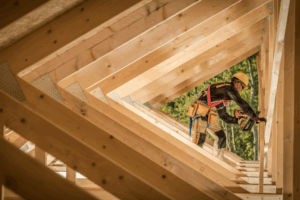Aboard Is Brighter, Shinier, AI-Powered, and Much More Useful
Almost everyone needs to manage data, but few people want to define how data should work.

A group of people watching Aboard re-launch.
First an earthquake, then an eclipse, and now our long-promised relaunch is finally here. Veteran tech journalist David Pierce of The Verge wrote it up, explaining how Aboard is growing from its link-saving roots—so let’s let him tell it:
But now I’m sitting here in a co-working space in New York City, a few minutes after an earthquake hit and a few days before Aboard’s biggest launch yet, and Ziade is showing me something very different. He opens up a beta version of the app and clicks a button, and after a second, the page begins to change. A database appears out of nowhere, with a bunch of categories — Year, Title, Genre, and more — that start to populate with a number of well-known movie titles. The board, as Aboard calls it, titles itself “Movie Night.” With one click, Ziade just built — and populated — a way to track your viewing habits.
The feature David is describing is called “Board Builder.” It’s a huge swing at the most boring, annoying problem in software, a problem so deadly we usually desperately avoid talking about it: Onboarding. The way it works is…get ready…you tell it what kind of board you want, and it builds it. (I know that I just wrote that Board Builder onboards by building boards in Aboard. I don’t love it either.)
Want more of this?
The Aboard Newsletter from Paul Ford and Rich Ziade: Weekly insights, emerging trends, and tips on how to navigate the world of AI, software, and your career. Every week, totally free, right in your inbox.
You might say “organize recipes” and it will build you a recipe-management board. Here’s a real-time animated GIF of that happening:

You might say “research productivity software” and it will collect a bunch of small-business tools and put them into a board for you:

You might even say, “A workflow to manage homeowner’s insurance claims, with 10 stacks that define the stages of claim assessment, and tags by type of property,” as we recently did, at which point the person on the other side of the demo, who works in insurance, said, “Umm…I’d change some things but…that’s extremely credible.”
First it defines the individual structure of a card:

Then it figures out how you would organize those cards:

All of this without a single meeting! It is extremely wild.
You don’t have to use AI to use Aboard. Your data is still there. You can still build boards from scratch—and now you can import CSV or Google Sheets files, too. You can still save links with the extension, or by sharing them in the mobile app. But if you want to get started at organizing just about anything…it’s extremely credible.
Why did we build this?
(So much for keeping this installment short.)
Aboard is a platform. Our main product until now was “a smarter way to bookmark,” but underneath that has always been a toolkit that can handle all kinds of data—not just web data—in a social, visual way. It’s a platform for spinning up custom software.
We learned something in the last year: Almost everyone needs to manage a little data, but very, very few people want to define how data should work—name columns, define key fields, identify what should be text or number. Even if you give them a nice, pretty way to do it.
And yet that’s where the real power lies—in defining custom ways to organize information that are right for you and for your community. So…how do we get that power into everyone’s hands? As The Verge put it:
In Aboard’s case, they want to use AI not as an answer machine but as something like a software generator. “We still want you to go to the web,” Ford says. “We want to guide you a bit and maybe kickstart you, but we’re software people — and we think the ability to get going really quickly is really, really interesting.” The Aboard founders want AI to do the work about the work, so you can just get to work.
Software is never done, and we have a lot more to work on, but this is the first version of Aboard where I can confidently say: This is what Rich and I set out to do. We’re aiming to make the world’s easiest data-management tool for individuals and groups, organizations and businesses. We want Aboard to work for the mutual aid group or weekly Bible study, the small not-for-profits with tiny budgets, or the giant companies integrating with legacy systems who need simple, adaptable software for thousands of employees. Wherever groups of humans gather and seek to make positive decisions for themselves, we will try to be helpful.
I should also note—I get to write the newsletter and take a lot of credit, but I’m the least essential person at Aboard. We have pushed our team hard to try new things under tight constraints, and everyone did something amazing. Any bugs are the fault of the co-founders.


